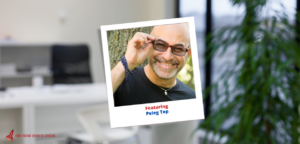Many writers and copywriters I work with are also aspiring authors.
They’re either working on a novel on their spare time. Or they have a book idea they’d love to develop further.
And some, like Denise Kiernan, transitioned from journalism and commercial writing into writing books for a living.
Denise is the New York Times bestselling author of Girls of Atomic City: The Untold Story of the Women Who Helped Win World War II, as well as a number of other books, including The Money Book for Freelancers and Signing Their Lives Away: The Fame and Misfortune of the Men Who Signed the Declaration of Independence, which she co-wrote with her husband Joe D’Agnese.
She also has a new book coming out in less than two weeks titled The Last Castle: The Epic Story of Love, Loss, and American Royalty in the Nation’s Largest Home, which I’m really excited about.
In this interview, Denise gives us a behind-the-scenes look into what it’s like transitioning from a freelance writer to a full-time author. She explains what it’s really like to come up with book ideas, pitch the best ones, land a book deal, research and write that book for months … and deal with far-off deadlines, procrastination and negative self-talk.
It’s a fascinating glimpse into the habits, rituals and challenges of a successful author.
The notes that follow are a very basic, unedited summary of the show. There’s a lot more detail in the audio version. You can listen to the show using the audio player below. Or you can subscribe in iTunes to get this show delivered straight to the Podcasts app on your smart phone, tablet or iPod.


High-Income Business Writing with Ed Gandia
#135: NY Times Bestselling Author Denise Kiernan on Maintaining High Productivity, Establishing Writing Rituals and Making a Living as a Full-Time Author
When did you know you were going to write for a living?
Denise Kiernan has been writing stories since she was a child.
In early graduate school, she worked for a college newspaper and found herself spending all her time in the newsroom.
Eventually, she got an internship with The Village Voice in NYC. Later, she moved from journalism to longer-form writing.
At what point did you move to book writing?
Denise’s first book writing experience was writing educational books for teachers. She enjoyed that experience and subsequently landed a larger ghostwriting gig.
She continued to work in a variety of writing projects, with the balance slowing tipping to book writing.
At one point, she and her husband analyzed how much time they spent developing and pitching ideas for shorter assignments. They came to realize that this time would be better spent developing a book proposal.
You and your husband Joe write traditionally published books. What’s that like?
The life of a writer tends to go in cycles. If you’re in a heavy research cycle, you might have to travel to different archives. If you’re ramping up for publication, you might have administrative responsibilities related to the launch. You’ll also have to dedicate a lot of time to promotional interviews and book tours.
But for the most part, you spend your time at home alone in your office.
What does your writing day look like?
If there’s serious writing to be done, Denise tries to do it in the morning before her brain gets clogged with other things.
Later in the day, she’ll shift to administrative tasks. She’ll try to visit with friends in the afternoon or evening to maintain human contact.
By scheduling her writing in the morning, she’s affirming that writing is a priority to her.
Your last book, The Girls of Atomic City, was a huge hit, becoming a New York Times Bestseller, Los Angeles Times bestseller and Amazon Top 100 Best Books of 2013. You were even interviewed on The Daily Show with Jon Stewart. Did you know your book was going to be this successful?
Denise had no idea. Of course, she believed in the book and hoped it would be well received. But she had no idea it was going to be a best seller on that scale.
As a writer, when you have a success like that, you have to fight the urge to try and reverse engineer it for next time. Of course, you want to choose a topic you’re enthusiastic about and have good people supporting you. But there’s a lot you can’t control.
Worrying about things that are outside of your control takes you out of the creative process.
Rather than worrying, your time is better spent working on your next book. Stay in forward motion. Don’t ruminate on the past.
How do you stay focused and disciplined when deadlines are months away?
Denise is a big fan of Getting Things Done by David Allen. Allen’s method identifies different levels of obligation and breaks larger projects into digestible segments.
For large projects, Denise will write out week-by-week milestones to track her progress. Having that roadmap, even if you re-route a thousand times, is essential.
Most of us mistake projects for tasks. If it’s not something you can quickly dash off, it’s not a task.
At the end of each day, she’ll look at what she needs to do tomorrow. Then the next morning, she’ll quickly review the decisions she made the night.
You may feel frustrated if you can’t stick to your particular plan. But it’s okay to adjust. Simply move on, adjust your expectations—and be nice to yourself.
We tend to overestimate how much we can get done in a long period of time and underestimate how much we can get done in a short period of time.
Whatever system you use to manage your day, you have to engage with that system regularly. Whether it’s to-do lists or Evernote or something else, that’s all fine. But you have to use it.
Do you schedule some of these tasks by hour? Or by mornings and afternoons?
When Denise has a lot of writing to do, she breaks up the day.
So, Denise will schedule focused writing sessions, with 30 minutes on, five minutes off. Or 50 minutes on, 10 minutes off. Or something similar.
During those short breaks, she’ll step away from her desk to do dishes, fold laundry, or something similar.
She’ll often write down her schedule for the day in advance. Sometimes she’ll track her time to see where it’s going. Often, she’ll do both to compare what she intended to do with what she actually did.
Tell us about working with your husband Joe. What’s it like having two writers in the house?
Denise and her husband share the same office. They’ve learned how to work without interrupting each other.
From a writing standpoint, it’s great to be married to another writer. Often, your partner will become your first editor. It’s important to have trusted friends who can give you lovingly honest feedback, and who want the best for you.
When Denise is feeling unfocused, it can be inspiring (and sometimes annoying) to have someone sitting across from her who’s working away productively.
Tell us about your upcoming book, The Last Castle
The Last Castle is narrative non-fiction. It’s the true story of the Biltmore House in Asheville, North Carolina, which is the largest house ever built in the United States.
The people who lived and worked in the house provide a fascinating insight into the Gilded Age and the rise of the Progressive Era. It’s like Downton Abbey but true.
The book comes out on September 26th. You can request an autographed copy by preordering through Malaprop’s Bookstore in Asheville, NC. You can also get an autographed copy by meeting Denise during her book tour.
Where can listeners learn more about you?
Website: denisekiernan.com
Twitter: @DeniseKiernan
Instagram: @IamDeniseKiernan
Facebook: @DeniseKiernanAuthor
![Denise Kiernan [image]](https://d3f9cx66g9im42.cloudfront.net/wp-content/uploads/2017/09/14130440/HIBW-135-How-NY-Times-Best-Selling-Author-Denise-Kiernan-Manages-Her-Long-Form-Writing-Projects.png)





